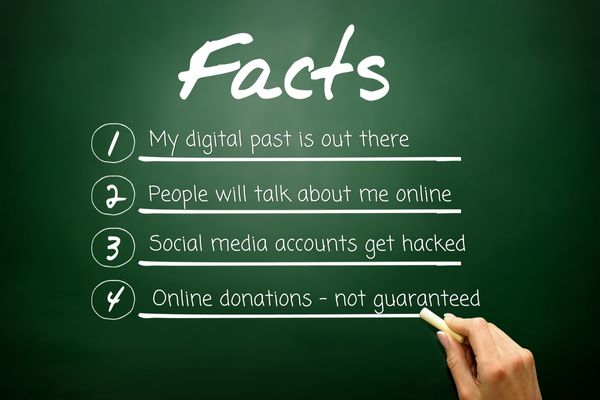What scares you most about running for office? For many individuals, the thought of running for office can be both exciting and daunting.
From asking people to donate to your campaign to the pressure of public speaking, there are numerous fears associated with campaigning that can feel overwhelming. Online campaigning adds its own unique challenges that require planning and attention to detail.
And if that isn’t enough, here are ten more things you might not know that can absolutely ruin your online campaign.
Your digital past can damage your campaign
If you’ve ever had embarrassing photos, tweets, posts, or other online information put online, there’s a good chance that they still exist in some form. Even if you try to do an online cleanup, it’s hard to fully eliminate everything out there. Saved screen shots, old photos on a hard drive somewhere, and even old social media posts can return to bite you.
Tip: Regularly review your digital history and remove or address problematic content. Don’t wait for opponents to find it first. Because they will.
Even offline, your reputation is online
Just because you’ve sworn off online campaigning doesn’t mean that newspaper articles and other material doesn’t exist about you online. When you become a political candidate, you become a public figure. If you are not putting information about yourself online, then someone else will.
Although it may feel overwhelming at times, monitoring your online mentions and setting up alerts can help you stay informed and prepared for any situation.
Free Digital Campaigning Tips: Subscribe for free guides and updates.
Your domain name can be hijacked before you start
Even if you are in the planning stages of running for office, you should reserve your domain name. If someone else registers the domain name, you may have a tough time getting it back. Often nothing is done with a high-jacked name, but announcing a website before you have registered the domain (or actually created the website) is just asking for trouble.
Your campaign branding can be hijacked, too
Political websites or accounts clearly designed to trick people into thinking they’re on a legitimate campaign website have been on the rise over the last decade. These spoof sites suggest the look and feel of legitimate sites. At first glance, they appear to be supporting a candidate, but in reality, they might providing misinformation or even raising funds for the opposition. Donors beware!
 There’s no guarantee that the web will pull in money
There’s no guarantee that the web will pull in money
The web is a powerful tool for fundraising, but it’s not a shortcut. Just because you slapped a donation button on your website and your social profiles does not guarantee that you will raise a single dollar. You need the right tools, messaging, and real support to raise funds. Done properly, the effort put into online fundraising can pay off handsomely. If you do it poorly, well…
Related: How Local Political Candidates Raise Money
Social media accounts get hacked … regularly
Social media account takeovers had increased over 1000% percent from 2020 to 2021, and have continued to rise in the 2020s. With those kinds of numbers, you’ll want to keep an eye on your campaign’s social media profiles. If multiple people have access to your campaign accounts, the risk of unauthorized access is increased. Best practices include limiting the number of people with social media account access. Only give people the minimum amount of access they need, and change account passwords frequently.
Tip: Use a password manager to securely store and rotate your campaign account credentials.
Social media accounts get mixed up … regularly
How many times have we heard about politicians posting inappropriate material to their social media accounts? You may wonder why this happens so often. The reason is simple. In most cases, someone posted publicly what was to be a private message sent to an individual. In other cases, someone (usually a staffer) was logged into the campaign’s social media account instead of their own. Either way, this can lead to an embarrassing situation requiring deletions, apologies, and negative media coverage.
Tip: Maintain separate devices or browsers for your campaign and personal accounts.
What you post is yours … until it isn’t
Your Facebook page, Instagram, and X / Twitter accounts are subject to the generosity of those services. Follow the rules for posting. Remember that these services can pretty much remove anything they want, at any time. If someone claims you are violating their terms of service, you could be in trouble. Losing a social media account late in the election cycle can be disastrous!
Just a few bad emails can cripple your email system
If a few people on your campaign email list don’t like your messages and report you as a spammer, it could ruin your chances for future messages to get through to anyone. Email service providers are quick to suspend accounts that are suspected of spamming.
Tip: Clean up your email lists regularly. Best practices include using double opt-in for new subscribers, and monitoring engagement metrics like open and click-through rates, and limiting the number of links in your messages.
Even when it’s over, it’s not over
If your election is over, consider hanging onto your website. If you let your domain name lapse, someone else can pick it up. You’ll probably have a tough time getting it back. Also, you’ll also have no control over a new website that someone may create with your lapsed domain name.
Online Candidate has been a trusted leader in candidate websites for over 20 years. We provide monthly and annual website packages with design and setup included. Explore our services today to see how we can help your campaign succeed.
« Planning Your Political Campaign – Candidate ChecklistsChoosing the Best Political Campaign Handle »
Tags: personal branding, political dirty tricks




![Local Political Campaigning During a Crisis [Infograph] headerimg](https://onlinecandidate-792f.kxcdn.com/articles/wp-content/uploads/headerimg-150x150.jpg)



